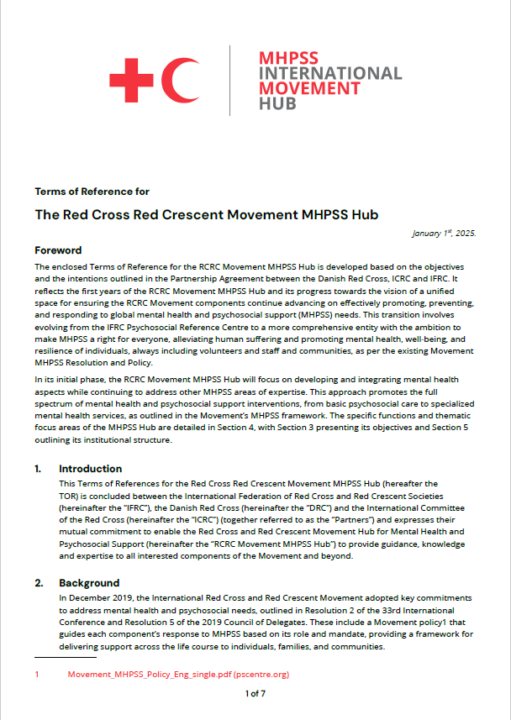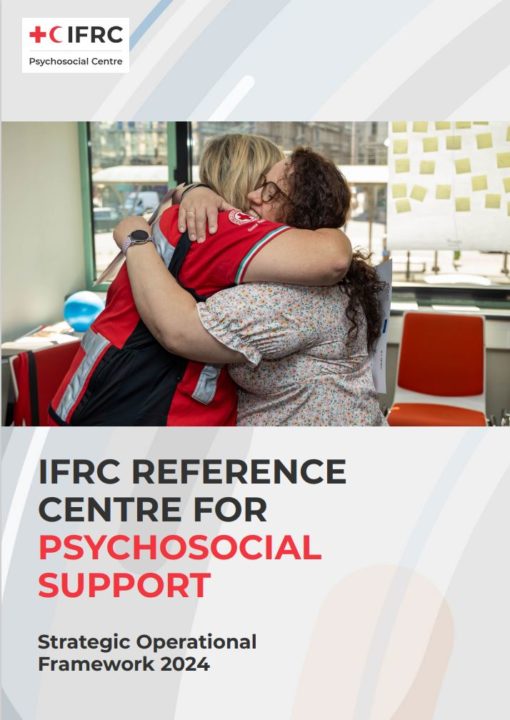
Increase the capacity of components of the Movement to respond to the mental health and psychosocial needs of populations, at all times and within their respective mandates. Communicate and advocate for MHPSS.
This includes strengthening MHPSS capacity and capabilities within the Movement and beyond, utilizing these capabilities to enhance services, programs, and meet needs. It also involves sharing MHPSS information internally and externally and advocating for MHPSS issues at all levels.
Contribute to the global body of knowledge on MHPSS and to related humanitarian diplomacy and advocacy efforts globally.
This covers all MHPSS knowledge generation, including research, monitoring, and evaluation, with a focus on using this knowledge to enhance humanitarian diplomacy, advocacy, service quality, and access to assistance for those with MHPSS needs.
Develop further MHPSS approaches in close collaboration with the ICRC, IFRC, National Societies, and other humanitarian agencies.
This includes collaborating with research institutions to develop innovative MHPSS approaches for global use and adapting existing approaches from other agencies for implementation within the Movement.
Develop capacities in accordance with the existing Movement MHPSS Policy, meeting the needs of different population groups and in line with the Functions as stated in Article 4 of this Term of Reference for the Movement MHPSS Hub.
This includes providing technical advice and support to Movement components specifically related to the implementation of the Movement Policy, with a key focus on developing technical guidance on the MHPSS Framework.
Create a platform to bring together professionals, researchers, and other relevant stakeholders to share knowledge, strengthen capacities and mobilize resources for MHPSS knowledge and skills generation.
This includes creating virtual and physical spaces, as well as offering training, webinars, campaigns, and other knowledge generating and sharing events.
Establish and foster partnership developments.
This includes forming strategic partnerships with internal and external entities.
Mobilize resources for the Movement MHPSS Hub.
This primarily focuses on fundraising efforts but may also involve negotiating in-kind contributions, such as staff time, staff on loans, consultancies, and other services.
The Terms of Reference (TOR) for the RCRC Movement MHPSS Hub were finalized, following extensive feedback collected during the global consultation with National Societies, IFRC, and ICRC staff between May and August 2024.

The 2024 Strategic Operational Framework (SOF) has been extended into 2025 and will be replaced by a new multi-year strategic framework once the RCRC Movement MHPSS Hub’s strategic planning process is completed. As 2025 marks a transformative year for the MHPSS Hub, it will be essential to include new MHPSS Hub members in the strategic planning process. During this interim period, the Movement Hub will continue its work under the 2024 SOF.
The 2024 SOF outlines the Movement Hub’s priorities as we prepare for the upcoming multi-year strategy. It guides our global efforts to support the Red Cross Red Crescent Movement in scaling up and improving the quality of MHPSS worldwide. Additionally, the SOF sets an ambition to sustain and expand global influence on MHPSS humanitarian diplomacy through a proactive, structured approach to policy events and decision-making processes.

The International Federation of Red Cross Red Crescent Societies’ Psychological Support Programme emerged in the early 1990s when an increasing number of National Societies recognized that disasters lead to not only physical hardships but also significant mental health challenges for affected populations. The traditional approach to relief – focused on shelter, food, and medical care – was proving insufficient to address the full impact of crises.
In response, the Reference Centre for Psychosocial Support (PS Centre) was established in 1993 as a “Centre of Excellence,” dedicated to supporting National Societies in promoting and enabling the psychosocial well-being of beneficiaries, staff, and volunteers. Hosted by the Danish Red Cross and based in Copenhagen, Denmark, the Centre operated as a delegated function of the IFRC.
In December 2019, the International Red Cross and Red Crescent Movement adopted key commitments to address mental health and psychosocial needs, as outlined in Resolution 2 of the 33rd International Conference and Resolution 5 of the 2019 Council of Delegates. These commitments included a Movement-wide policy to guide each component’s MHPSS response according to its specific role and mandate, establishing a framework for delivering support across the life course to individuals, families, and communities. It was decided to transform the PS Centre into a Movement-wide MHPSS Hub.
On January 1, 2025, the PS Centre transitioned into the Red Cross Red Crescent (RCRC) Movement MHPSS Hub, a transformation solidified through a tripartite agreement signed by the International Federation of Red Cross Red Crescent (IFRC), the International Committee of the Red Cross (ICRC), and the Danish Red Cross (DRC). The MHPSS Hub is hosted by the Danish Red Cross.
The transformation of the IFRC Psychosocial Centre into the RCRC Movement MHPSS Hub, led jointly by the Danish Red Cross, IFRC, and ICRC, underscores the Movement’s deep commitment to building global capacity to promote mental health, alleviate suffering, and foster resilience in communities worldwide.
The IFRC launches the Psychological Support Programme as a cross-cutting programme under the Health & Care Division.
The International Federation Reference Centre for Psychological Support is established.
As a response to the Yugoslav
Wars resulting in the breakup
of Yugoslavia, the PS Centre
gives support to programmes
for children affected by armed
conflict.
A roster of MHPSS experts is
formed and administrated by
the PS Centre.
The Gujarat earthquake in
India, killing between 14,000
and 20,000 people, causes
mental health problems
among the affected survivors.
Through an MHPSS delegate,
the PS Centre becomes
involved.
As a response to the
psychosocial needs after the
Bam eartquake in Iran kills
more than 34,000 people,
Iranian Red Crescent - with
support from the PS Centre
- deploys 11 psychosocial
support teams.
The IFRC Psychological Support Policy Paper establishes the basis of Red Cross Red Crescent intervention both in emergency response operations and in the implementation of long-term development programmes.
The Centre changes its name to the Reference Centre for Psychosocial Support, underlining the community-based character of the interventions.
The 2004 Indian Ocean earthquake and tsunami, killing more than 225,000 people in 14 countries further reveals the need for a formalized psychosocial support programme within the Red Cross Red Crescent Movement.
The Interagency guidelines for MHPSS in Emergencies is published. The guidelines lay out a multi-sectoral, inter-agency framework for implementing MHPSS in an emergency context.
The PS Centre becomes co-chair of the Inter-Agency Standing Committee Reference Group on Mental Health and Psychosocial Support in Emergency Settings.
The UN Human Rights Council adopts a resolution recognising the importance of integrating mental health services into primary and general health care.
The Red Cross Red Crescent Movement adopts a joint Movement policy and a resolution on addressing mental health and psychosocial needs of people affected by armed conflicts, natural disasters and other emergencies.
A roadmap for implementing the Movement policy and resolution on MHPSS sets out key activities for the Movement and outlines the outputs and outcomes expected by 2023. The PS Centre is instrumental in its implementation.
The Covid-19 pandemic causes a global need for MHPSS response tools. The PS Centre produces more content in 12 months than in any proceding year, including new formats such as podcasts and training videos.
The armed conflict in Ukraine initiates the largest MHPSS response programme in the history of the IFRC. The PS Centre has a central part in this response.
On 5 February, the Danish Red Cross, IFRC and ICRC agree to, finalize and sign the partnership agreement for the future Red Cross Red Crescent Movement MHPSS Hub – transforming the IFRC Psychosocial Centre into a mental health and psychosocial support Hub across the entire Movement.
In June, the PS Centre hosts a three day conference in Copenhagen: MHPSS Momentum: Celebrating 30 years of mental health and psychosocial support - What have we learnt and where are we going? celebrating it's 30 year anniversary.
1 January 2025, the IFRC PS Centre transitions into the Red Cross Red Crescent (RCRC) Movement MHPSS Hub. This transformation is based on a tripartite Partnership Agreement between the IFRC, the ICRC and the Danish Red Cross. The agreement outlines the framework for the establishment, operation, and management of the Hub.
Stay connected with psychosocial support and the latest news and events
The Red Cross Red Crescent (RCRC) Movement MHPSS Hub (MHPSS Hub) is dedicated to advancing mental health and psychosocial support (MHPSS) throughout the RCRC Movement. Hosted by the Danish Red Cross, the Hub collaborates with National Societies, the International Committee of the Red Cross (ICRC), the International Federation of Red Cross and Red Crescent Societies (IFRC), as well as international humanitarian organizations and academic institutions. By uniting expertise from across the Movement and beyond, we help build stronger, more resilient communities better equipped to cope with crises and recover from adversity.
Red Cross Red Crescent Movement MHPSS Hub
Hejrevej 30, st.
2400 Copenhagen NV
Denmark
Site language:
